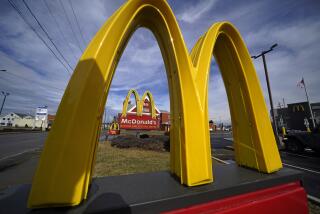Hudson to Sell Beef-Processing Plant to IBP
- Share via
One of the nation’s largest meat processors, IBP Inc., on Wednesday said it agreed to buy Hudson Foods Inc.’s state-of-the-art beef-processing plant in Columbus, Neb., the focus of a recent massive recall of ground beef linked to possible E. coli contamination.
Terms of the deal were not disclosed.
Since the recall, meatpacking trade groups are pushing the industry to change hamburger-processing methods and abandon the common practice of mixing in one day’s leftovers with the next day’s supply.
Experts say the process, known as “reworking” the refrigerated meat, is safe. But it’s one more way E. coli bacteria that sickened about 16 people in Colorado this month could spread through several batches of meat.
Earlier this week, the National Meat Assn. sent a letter to its 600 members, including meatpackers, processors and equipment suppliers, recommending that they no longer mix in the leftover meat.
“We are recommending an absolute break in continuity” between one day’s production and the next, spokeswoman Rosemary Mucklow said.
The U.S. Agriculture Department and Hudson Foods believe the E. coli bacteria in Hudson’s hamburger patties most likely came from one of several slaughterhouses the company uses. The bacteria contaminated frozen beef patties made at Hudson’s Columbus plant on June 5.
IBP, a major beef and pork producer based in Dakota City, Neb., said it had taken an option to acquire the plant, which produces ground-beef products for the food-service and retail-food industries.
The sale of the plant would take Rogers, Ark.-based Hudson out of the business of producing raw ground beef, although it still has cooked-beef operations. Hudson is the No. 3 publicly traded poultry processor in the U.S.
The plant’s operations were voluntarily suspended on Friday while the company works with the Department of Agriculture on finding the source of the contamination, which Hudson says is most likely from outside. In the largest meat recall in U.S. history, Hudson recalled 25 million pounds of ground beef that had been produced at the plant.
“The plant is in excellent condition,” said Robert Peterson, chairman and chief executive of IBP, in a statement. “It is well laid out and includes the latest production technology. We are dedicated to ensuring the manufacture of safe, wholesome, high quality products that IBP is known for.”
Hudson announced the plant was up for sale earlier this week after it lost one of its biggest beef buyers--Burger King restaurants--because of the recall.
The plant, about 2 years old, cost Hudson about $35 million and was built exclusively to Burger King specifications. Merrill Lynch analyst Leonard Teitelbaum estimated the current book value of the plant at $27 million to $30 million.
Hudson Foods stock closed up $1.25 at $16.38, and IBP rose 6 cents to close at $22.75, both in consolidated New York Stock Exchange trading.
IBP said that it hoped to complete the acquisition within the next several weeks and that it planned to retain all current Hudson employees at the plant.
The E. coli scare spooked the entire meatpacking industry, said Janet Riley, spokeswoman for the American Meat Institute, an industry trade group.
“Everyone was shocked by the magnitude of what happened to Hudson,” Riley said. “It’s particularly frustrating because, even in the most perfect plant, there’s no way to guarantee perfect product.”
The Agriculture Department is expected to issue a report on the Hudson scare within two weeks, and many expect some recommendation on the use of leftover meat.
More to Read
Inside the business of entertainment
The Wide Shot brings you news, analysis and insights on everything from streaming wars to production — and what it all means for the future.
You may occasionally receive promotional content from the Los Angeles Times.










